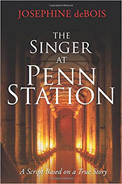
 |
Engaging, suspenseful, and ready for the big screen, this screenplay has all the elements necessary for a blockbuster movie. The plot is complex, and the story is filled with action, mystery, sex (appropriate and tasteful), and violence. The last movie with the depth, intrigue, and suspense equal to Singer at Penn Station was arguably Dan Brown's novel made into the highly successful movie, The DaVinci Code.
Main character, Sergeant Samuel, is a cop, who is demoted to the traffic police for reasons initially unknown. As he settles into his new role, he can't help but sympathize and get involved in the lives of those on the street. In particular, he is drawn to a vagrant with an angelic voice, singing without a permit in Penn Station. Samuel befriends the talented singer, Olis, and there the mystery/thriller begins. Intrigue about where Olis came from and what happened to him leads all the way back to the Vatican. The story unfolds as Samuel meets a seemingly endless string of characters whose fears, greed for money or pursuit of power lead them into sinister lives of drugs, sex, betrayal, and murder. There is no guessing who the good guys and bad guys are, especially since some waver between good and evil.
There are more characters than a typical novel. On the screen, it will not be difficult to keep the cast straight, but it takes a bit of concentration in book form. No matter, readers will find themselves so wrapped up in the story that it isn't likely the book will be set aside for long enough to forget who any of the characters are. In addition, the story unfolds on the streets of New York City and in Italy. There are so many opportunities for a director to shoot in familiar settings for New Yorkers and show American readers much of the streets and countryside of Italy.
There are a few rape scenes and murders written into the story. Action is nonstop, as is true to life for New York City and Rome. There is opportunity for a stunning cinematographic movie, especially when shooting scenes in the Italian countryside. Street scenes will keep viewers wondering who is involved and who is a passerby. But the story goes deeper, including some genetic intrigue and even some meditation and spiritual mystery. People may spend weeks contemplating the plot and tying it all together after reading or seeing this story.
The sinister workings within the Vatican and among Catholic subjects may offend some, but there are numerous good, practicing, earnest Catholic characters to give fair balance. For example, Huang, Samuel's traffic-cop partner, is a faithful, purely good man, with a loving, giving, and devout Catholic family. They symbolize all that is good in their religion. In their case, their faith brings them a sense of community, love, support, and purity of heart.
Josephine deBois is an experienced writer. Her characters are well developed and believable. The dialog is skillfully written, such that readers can easily imagine sitting at the dining room table and engaging in conversation with these characters. Even in book form, the relationships between characters come to life, but on screen, the connections, rapport, and sometimes chemistry among the plethora of characters, both admirable and detestable, will seal the screenplay's fate as an absolute must-see movie.
RECOMMENDED by the US Review